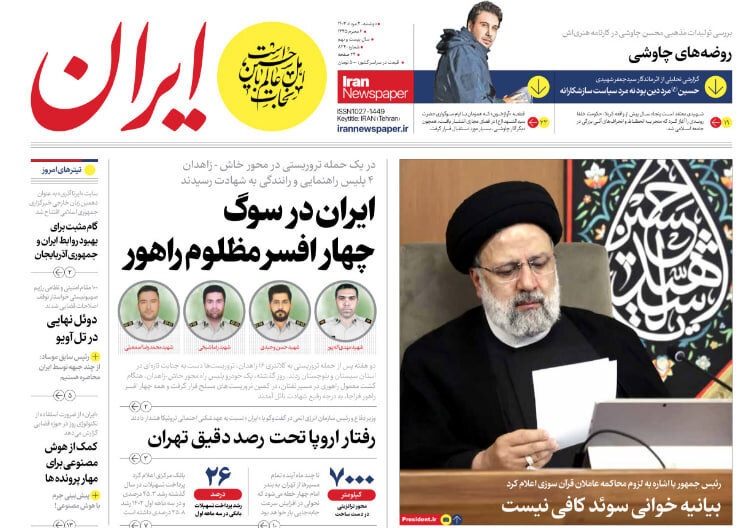Europe's behavior under close observation of Iran

In a note, the Iran publication addressed the threat by the European trio (Britain, France and Germany) they it will not lift missile sanctions against the Republic’s Islamic that will expire in October.
It wrote: Regarding Iran's possible reaction to any change that contradicts the obligations of the other parties, Mohammad Eslami, the head of the Atomic Energy Organization, said: "The Ministry of Foreign Affairs and related institutions are closely monitoring the behavior of the other countries and will react to it on time." This position of Eslami goes back to the claim of the three European countries that increase in Iran's uranium enrichment level is a dangerous development and contrary to the JCPOA. The close monitoring of the current situation and the possible decision of Europe to cancel the missile sanctions, shows that any error by the opposite parties will be faced by the premeditated measures of the Islamic Republic. Therefore, it may be necessary for the Europeans to ask themselves the question of the Reuters news agency before implementing any decision regarding Iran: "What response and retaliatory steps will the Iranians take against the maintaining sanctions?"
Vatan-e-Emrooz: Barbarism is alive in Europe
In an analysis of the recent disrespect to the Quran in certain Scandinavian countries, Vatan-e-Emrooz wrote: European countries, despite the claims that they are civilized, remain in their past and have preserved the brutal and inhumane spirits of their ancestors. Apart from all the insults of the Westerners against Islam and Islamic sanctities over the past years, the recent three cases of disrespect to the Qur'an in Sweden and Denmark, which happened with the greenlight of the respective governments, show that Europeans, contrary to what the claim, not only have no freedom of speech, but any issue that is against their opinion is not tolerated at all. The freedom of speech is “slaughtered” by Europeans while Sweden has announced that the recent disrespect to the Holy Quran was in line with freedom of speech (!). On the opposite side of the brutality of Westerners, there are Muslim societies who respect the holy books of all divine religions, including the Bible. However, those European medieval societies call themselves civilized and Muslims as third world. This is one of the bitter jokes of the current times in history.
Sobh-e-No: A letter from Doha to Tehran
In its headline, Sobh-e-No discussed the meeting of Qatar's Deputy Foreign Minister Mohammed Abdulaziz Al-Khalifi with Amir Abdollahian and submission of an invitation letter from the Emir of Qatar to Raisi to visit Doha. The paper wrote: Although it is still unclear what message the letter of the Emir of Qatar to Raisi carries, undoubtedly this issue is related to Iran's international relations, and it is not unlikely that this issue is related to the JCPOA negotiations. Considering that the Foreign Minister of Qatar has repeatedly announced that his country is trying to encourage the JCPOA parties to revive the nuclear agreement and resume nuclear negotiations, as they did so in February of last year when the Foreign Minister of Qatar declared: "The Americans gave us a message to convey to Iran that is related to the issue of the agreement, although it may not be directly related to it." In this regard, U.S. Secretary of State Blinken just recently said that his country does not refuse the possibility of returning to negotiations with Iran over nuclear issues, and that any agreement that Washington signs with Tehran must fulfill the United States’ security goals and interests.
Ham Mihan: The end of the conflict; the region upgrade
Ham Mihan conducted an interview with Adnan Tabatabai, an analyst on Middle East issues, about the rapprochement between the regional countries. Tabatabai said: It is clear that changes in the Middle East -- such as the resumption of relations between Iran and Saudi Arabia, the return of Syria to the Arab world, the negotiations between Saudi Arabia and Ansarullah, the prospect of resuming Iran's relations with Egypt and Jordan coupled with developments in North Africa -- have covered all prominent countries in the region like a domino. What is known today as the new understanding of West Asian countries seeks to move our region in a direction that might have been difficult to imagine a few months ago. If the policy of zero conflict with the neighbors goes ahead without problems, in the near future, in addition to the regional players, the policy of extra-regional countries towards the Middle East will undergo change as well. The resumption of Iran's relations with Saudi Arabia, Jordan and Egypt will improve Iran's position in the region. So despite the geopolitical competition, the stability required for operating the super projects defined by the crown prince of Saudi Arabia is the reason for Riyadh's desire to reach an agreement with Tehran.
